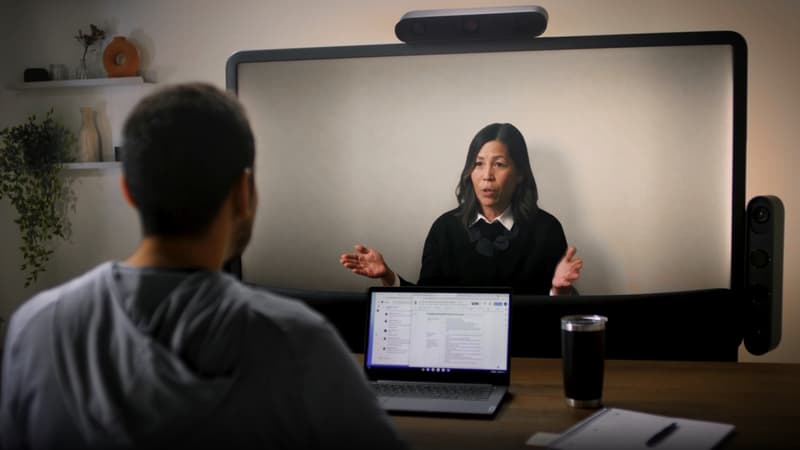The screen rings and turns on, then my interlocutor appears. I have the impression that he is going to cross the screen and invite himself to my room. If you’ve seen movies like Elf EITHER The circle, where there is always someone (or something) that ends up coming off the television, that’s a bit of that, minus the horror.
Thrown into a video call, I find myself in front of a 3D rendering of my partner, Andrew. But this one seems very real in front of me, as if installed on the other side of the table, behind this strange window.
The feat is made possible by a screen designed in-house by Google and surrounded by three blocks comprising “standard” cameras and speakers. These are the cameras that will constantly snap photos of him and me from every angle, reconstituting our photorealistic digital double, and Google’s artificial intelligence animating everything live. The data travels, through the Internet, from one room to another without revealing the slightest latency that would complicate the conversation.
Stunning photorealism
The representation is simply impressive. In the same way that we would maintain a sustained and natural conversation in videoconference, we exchange as normally as possible. Live, Google’s artificial intelligence allows you to calculate movements at breakneck speed, assemble photos to give the sensation of talking to each other “between humans”.
Certain skin imperfections, especially on the neck, remind us that we are dealing with a prototype. But the impression it leaves is already crazy. While the screen is actually flat, the 3D effect really adds another dimension to the conversation and the panel appears curved.
Unlike a simple Zoom exchange, it would seem unthinkable for us to look at our phone while the other person is talking, so much would we feel that we are disrespecting them. There we remain concentrated and focused on the person, with the strange sensation that he is “there”. Our eyes follow her, her eyes stare at us (thanks also to the AI fix). If she turns her head or if we move to the side, we will have another angle of vision.
It is also possible to use the tool with several people, says Google. Everyone will appear the same in the conversation. With the plus of being able to put a green background to embed an image and make it appear. Eventually, Starline engineers even hope to add collaboration features that work naturally and immediately on both sides to share documents, annotate a whiteboard of sorts.
Hands that join and disappear
What is the difference between Starline and a video conference? Most. First of all, the strange sensation of having another person with you and not in front of you. Granted, she’s behind a screen, but the 3D effect makes the interaction really different. My interlocutor shows me an apple and hands it to me, and he grabs me, as if he could grab it.
All without glasses or a virtual or augmented reality helmet. Andrew sees the notebook on my desk, my head nods. As we greet each other, we decide to shake hands. And the most natural thing in the world, each hand approaches as if it were crossing the screen, except that at the moment of “contact”, they disappear…
The most impressive thing about this Starline project is this ability to bring reality to the virtual. The distance had never been so short. More natural and fluid, the system makes the conversation easier, more attractive and rich in exchanges. There it is impossible to be passive and that is undoubtedly his forte: his ability to create a much more tangible virtual relationship. Starline is far from being in the launch phase. Google is only starting its tests with a few handpicked partners (WeWork, Salesforce, T-Mobile) to get early feedback.
Source: BFM TV


